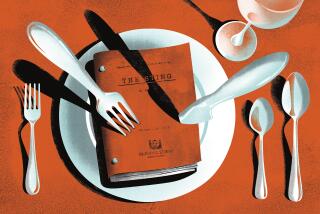Mr. Tuba : Music: Nicknamed by the late conductor Leopold Stokowski, Indiana University professor Harvey Phillips has had a love affair with the tuba for most of his 60 years.
- Share via
TUBARANCH, BLOOMINGTON, Ind. — Harvey Phillips has devoted most of his 60 years convincing composers, audiences and anyone who might assail an oom-pah-pah about the endearing charms of the big, ungainly, frequently maligned tuba.
He was dubbed “Mr. Tuba U.S.A.” by no less than the late conductor Leopold Stokowski.
How has he lived up to the name?
* In 1960 there was only one full-time tuba professor in the United States. Today there are more than 90. The best known and one of the finest players is Phillips himself at Indiana University.
* When the tuba position becomes vacant in an orchestra today, 150 tuba players may apply for the chair, Phillips says, and 100 would be suitable, 50 would be superb and two or three would be truly great artists.
* With Phillips as an inspiration, tuba festivals have been booming nationwide.
For 40 years, he has been pursuing composers. “What kind of career would (Jascha) Heifetz have had if he’d only had funny tunes to play on the fiddle?
“Composers’ business is organizing sound. When they hear a new sound, they get excited. I never, to this day, have been rejected by a composer. The composer is absolutely our best friend.”
The tuba was invented in 1835, but no composer made it a star until 1954 when Ralph Vaughan Williams’ tuba concerto was commissioned by the London Symphony. Now there are hundreds of compositions for tuba.
Phillips teaches, promotes, inspires, organizes and administers well enough that nine colleges or universities have offered him their presidencies in the last 10 years. He refuses because it would cut down on everything else he does.
And Phillips wants the 104-acre Tubaranch outside Bloomington to be the home that he, his wife Carol and their three grown sons can come back to.
Phillips’ love affair with the tuba began via the wraparound sousaphone, which plays the same music. When he was 13, in 1942, in Marionville, Mo., Phillips inherited the school-owned sousaphone. He bicycled to band practice wearing the instrument. “If the wind was behind me, I didn’t have to pedal.”
Two years later, bandmaster Homer Lee, a retired circus bandmaster, found Phillips a used tuba to buy for $60 and recommended that the King Bros. Circus hire him for the summer.
His first year with the circus, Phillips says, they played 187 titles. They’d play Wagner’s “Ride of the Valkyries” to introduce the trapeze artists, ascending-scale music as they climbed up, fast gallops to get them down, and “12th Street Rag” to signal the clowns to distract if a high-wire act fell.
Later, Phillips joined the Ringling Bros. band. The New York Philharmonic’s great tuba player, William Bell, sat in at Madison Square Garden. In 1950 Bell got Phillips a four-year scholarship at the Juilliard School. “I became aware, fairly early on after I got to Juilliard, that my instrument was a second-class citizen among the other instruments. I never felt that with the circus.”
One evening, walking to his Juilliard practice room, Phillips heard piano, violin and flute students playing Chopin, Mendelssohn, Handel and Mozart. He took out his music. “Solo Bombasto,” “Asleep in the Deep,” “Locked in the Cradle of the Deep,” “Jig Elephantine.”
“The next morning I asked (professor) Vincent Persichetti if I could see him. I poured my heart out about the tuba literature. He said: ‘First, all the music ever written belongs to you as much as it belongs to anybody else. If you like a Bach flute sonata or Mozart horn sonata, take it, play it.’ Then he got a little sarcastic and said: ‘You want better music for your instrument? Do you think a violinist is going to do something about it? You’ll have to do something about it.’ ”
Phillips calls the tuba a joyous instrument to play and says that brass are the second most physical of musical instruments, after the voice.
“I’ve been in a room where a Strad (Stradivarius) was played by different violinists, who got a different sound. The tuba is the same. There is a sound that each person has that emanates from the soul, from the inner being, that comes through.”
Phillips became vice president for finance of the New England Conservatory of Music in 1967. He left the conservatory for Indiana University in 1971 and used $7,500 of his own money for the first International Tuba Symposium there in 1973. Three hundred tuba players attended. He invited 72 composers--69 came--most of whom knew only one tuba player, Phillips. “It was a chance for them to realize there are lots of great tuba players, and the more they write, the more performances they’re going to get.”
Composer Alec Wilder, a collaborator and friend, ordered Phillips to quit using money his family might need and to set up a foundation that could accept donations, to assist young musicians, commission music and underwrite meetings. Wilder said it had to be the Harvey Phillips Foundation so people would know what it was. Phillips also helped start Tubists Universal Brotherhood Assn., which has more than 2,000 members.
In selling the tuba as a serious instrument, Phillips says, “You may have to do something that seems off the wall.”
In 1975, he inaugurated Octubafest and they are now are held on more than 100 American campuses.
More to Read
The biggest entertainment stories
Get our big stories about Hollywood, film, television, music, arts, culture and more right in your inbox as soon as they publish.
You may occasionally receive promotional content from the Los Angeles Times.










